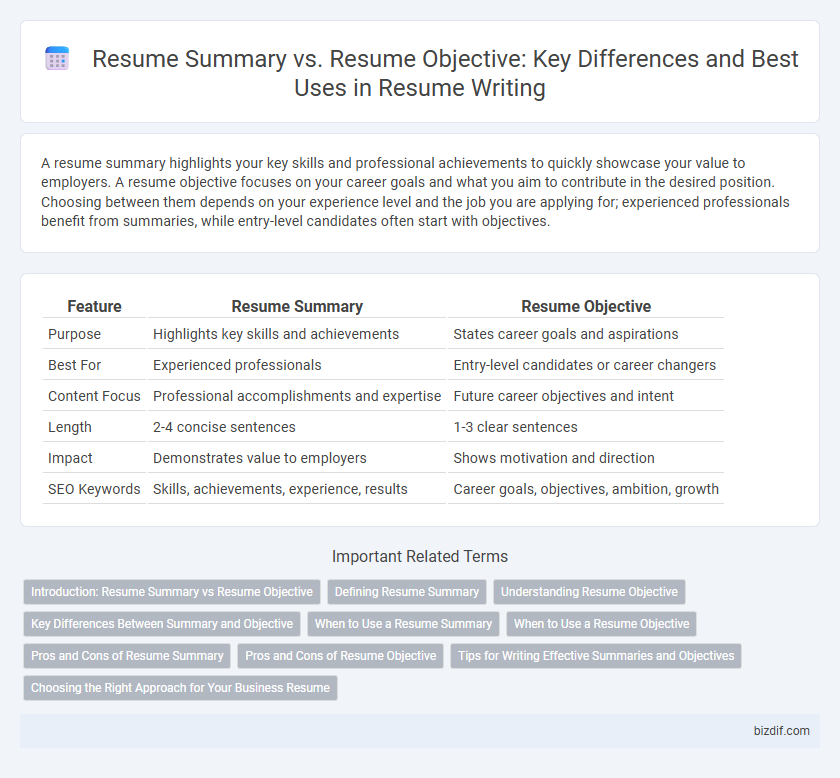A resume summary highlights your key skills and professional achievements to quickly showcase your value to employers. A resume objective focuses on your career goals and what you aim to contribute in the desired position. Choosing between them depends on your experience level and the job you are applying for; experienced professionals benefit from summaries, while entry-level candidates often start with objectives.
Table of Comparison
| Feature | Resume Summary | Resume Objective |
|---|---|---|
| Purpose | Highlights key skills and achievements | States career goals and aspirations |
| Best For | Experienced professionals | Entry-level candidates or career changers |
| Content Focus | Professional accomplishments and expertise | Future career objectives and intent |
| Length | 2-4 concise sentences | 1-3 clear sentences |
| Impact | Demonstrates value to employers | Shows motivation and direction |
| SEO Keywords | Skills, achievements, experience, results | Career goals, objectives, ambition, growth |
Introduction: Resume Summary vs Resume Objective
A resume summary provides a concise overview of a candidate's experience, skills, and achievements, highlighting qualifications relevant to the job. A resume objective focuses on the applicant's career goals and intentions, often used by entry-level candidates or those changing careers. Effective resume writing requires choosing between a summary or objective based on professional background and target job role.
Defining Resume Summary
A resume summary is a concise statement highlighting a candidate's key qualifications, skills, and professional achievements tailored to the job role. It captures relevant expertise and career accomplishments in 3-4 impactful sentences, designed to quickly engage hiring managers. Unlike a resume objective, which focuses on career goals, the resume summary emphasizes proven value and past results.
Understanding Resume Objective
A Resume Objective is a concise statement that highlights a candidate's career goals and intentions, tailored specifically to the job applied for. It emphasizes the applicant's desired role and what they hope to achieve, often used by entry-level candidates or those changing careers. Clear, focused Resume Objectives improve relevance and align with employer expectations, making them essential for targeted job applications.
Key Differences Between Summary and Objective
Resume summaries highlight professional achievements and key skills in a concise paragraph, targeting experienced candidates by showcasing value and expertise. Resume objectives focus on the candidate's career goals and intent, ideal for entry-level applicants or those changing industries. The key difference lies in summaries emphasizing past accomplishments, while objectives emphasize future career aspirations.
When to Use a Resume Summary
Use a resume summary when you have substantial professional experience or career achievements relevant to the job you're applying for, as it highlights key skills and accomplishments quickly. This section is ideal for mid-level to senior professionals aiming to showcase their expertise and value to employers concisely. It improves keyword optimization by aligning specific qualifications with job descriptions, increasing the chances of passing applicant tracking systems (ATS).
When to Use a Resume Objective
Use a resume objective when starting a new career, changing industries, or targeting a specific job role to clearly communicate your goals and relevant skills. This section is concise, typically one to two sentences, emphasizing your ambition and how you plan to contribute to the employer's needs. Resume objectives help entry-level candidates and career changers stand out by aligning their aspirations with the job description and employer expectations.
Pros and Cons of Resume Summary
Resume summaries provide a concise overview of relevant skills and accomplishments, making them ideal for experienced professionals aiming to showcase their expertise quickly. They enhance keyword optimization for applicant tracking systems, increasing the chances of passing initial screenings. However, resume summaries may lack specificity for entry-level candidates or career changers who benefit more from clear, goal-oriented resume objectives.
Pros and Cons of Resume Objective
Resume objectives clearly state a candidate's career goals and are beneficial for those changing careers or entering the job market, providing recruiters with insight into the applicant's motivations. However, they may appear self-centered and less focused on the employer's needs, potentially weakening the overall impact compared to a resume summary. The limited scope of a resume objective can reduce the emphasis on skills and achievements, which are often more effective in capturing attention and demonstrating value.
Tips for Writing Effective Summaries and Objectives
Craft a resume summary by highlighting key achievements and skills relevant to the target job, using concise and impactful language to capture the employer's attention. When writing a resume objective, focus on specific career goals aligned with the company's needs, emphasizing how your background and aspirations make you a strong fit. Tailor both summaries and objectives to the job description using targeted keywords to increase ATS compatibility and improve the chances of landing an interview.
Choosing the Right Approach for Your Business Resume
A Resume Summary highlights key achievements and skills, showcasing your value to potential employers with concise, impactful statements tailored to your business role. A Resume Objective focuses on your career goals and intentions, ideal for candidates entering a new industry or targeting a specific position within business sectors. Selecting the right approach depends on your experience level and the business resume's purpose, ensuring alignment with hiring managers' expectations and industry standards.
Resume Summary vs Resume Objective Infographic

 bizdif.com
bizdif.com